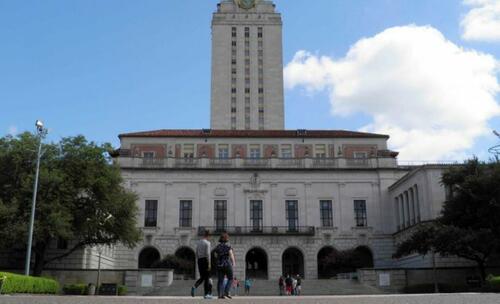
Authored by Bryan Jung via The Epoch Times (emphasis ours),

Students at the University of Texas at Austin were found to be responsible for a censorship project that targeted conservative news outlets.
The Global Disinformation Index’s (GDI) report, which called for the blacklisting of conservative news organizations, was written up by students under the direction of academics working at the University of Texas at Austin’s Global Disinformation Lab (GDIL), The Federalist reported.
In the disinformation index, the group labeled several conservative media companies as the riskiest.
The academics in charge of the lab allegedly held an anti-conservative bias in readings of internal communications, along with several other accusations found in the over 1,000 pages of documents reviewed by The Federalist.
Publicly Funded Organization Involved in News Blacklist
The Washington Examiner investigative reporter, Gabe Kaminsky, published a Feb. 9 exclusive multi-part series: “Disinformation Inc.”
Kaminsky revealed that “self-styled ‘disinformation’ tracking organizations,” such as the GDI’s review of the top ten “riskiest American news organizations, were heavily biased against conservative outlets.
Conservative news outlets such as American Spectator, Newsmax, The Federalist, American Conservative, One America News, The Blaze, Daily Wire, RealClearPolitics, Reason, and the New York Post, generally had the lowest ratings.
In contrast, left-leaning news publications like The New York Times and CNN were among the top 10 “least risky” in their rating system.
GDI sold its lists to marketing organizations, which led to companies pulling advertisements from blacklisted outlets and thus starving them of funding.
For example, Microsoft’s Xandr used GDI’s blacklist to limit advertising dollars, but has since reportedly dropped its use of the blacklist after the series was published, reported the Washington Examiner.
The government-funded National Endowment for Democracy was also caught granting GDI over $500,000 between 2020 and 2021, while the State Department’s Global Engagement Center similarly awarded the GDI $100,000 in taxpayer funds in 2021, wrote Kaminsky.
University of Texas Caught in Media Censorship Controversy
Meanwhile, GDI released a report with help from researchers at the University of Texas at Austin on Dec. 16, 2022, called “Disinformation Risk Assessment: The Online News Market in the United States.”
After the report admitting the targeting conservative outlets was published, The Federalist filed a public records request at UT Austin in February, demanding all communications related to GDIL’s work with the GDI on the news media review.
Despite actions by UT Austin to withhold some of the details of its methodology and research over concerns regarding “confidentiality of trade secrets” and “certain commercial or financial information,” the internal documents that were released revealed many concerning details.
The files showed that the GDI paid the university to have student researchers, with little training, apply the organization’s screening methodology to rate the various media outlets for its final report, which gave conservative news outlets low ratings.
GDI sold the university project to GDIL with the goal of influencing the 2022 midterms, The Federalist reported.
Student researchers were recruited by being informed that their work would be “immediately valuable” since GDI would release it early “to make waves ahead of the midterms” and affect reportage of the 2022 election.
After the team was finished, UT Austin retained any surplus funds that GDI received for the work, leading critics to question how a state-funded university could profit from such a politically biased program.
Biden Administration Continues to Fund Censorship Operations
Additional documents from GDIL further revealed that GDI had an even larger role in censorship activities than had been previously known, according to The Federalist.
It was revealed by these internal files that GDI and GDIL were also working with the Biden State Department and other prominent public and private organizations to censor conservatives.
A top lab manager on the project at UT Austin wrote in an internal email communication that GDI worked “with governments, policymakers, social media platforms, and adtech companies to defund disinformation.”
“They are instrumental in providing data to a bunch of people that I am not sure if I am allowed to talk about,” the lab manager continued, adding GDI had formal and informal relationships with “trust and safety teams at various big platforms, the most recently announced partnership is with Twitch.”
In addition, an email GDIL received from the Global Engagement Center’s “Academic and Think-Tank Liaison” showed that the State Department had developed a close relationship with a growing number of universities and publicly funded think tanks to promote the censorship of anti-progressive views, according to The Federalist.
The State Department was exposed for its dealings with the Centre for Information Resilience, whose vice president happens to be former Department of Homeland Security disinformation czar, Nina Jankowicz.
Jankowicz was pushed out of DHS by the Biden administration last year after a massive backlash caused the termination of the much-criticized censorship program.
The Epoch Times reached out to the University of Texas at Austin GSIL, GDI, and the State Department for comment.
Authored by Bryan Jung via The Epoch Times (emphasis ours),

Students at the University of Texas at Austin were found to be responsible for a censorship project that targeted conservative news outlets.
The Global Disinformation Index’s (GDI) report, which called for the blacklisting of conservative news organizations, was written up by students under the direction of academics working at the University of Texas at Austin’s Global Disinformation Lab (GDIL), The Federalist reported.
In the disinformation index, the group labeled several conservative media companies as the riskiest.
The academics in charge of the lab allegedly held an anti-conservative bias in readings of internal communications, along with several other accusations found in the over 1,000 pages of documents reviewed by The Federalist.
Publicly Funded Organization Involved in News Blacklist
The Washington Examiner investigative reporter, Gabe Kaminsky, published a Feb. 9 exclusive multi-part series: “Disinformation Inc.”
Kaminsky revealed that “self-styled ‘disinformation’ tracking organizations,” such as the GDI’s review of the top ten “riskiest American news organizations, were heavily biased against conservative outlets.
Conservative news outlets such as American Spectator, Newsmax, The Federalist, American Conservative, One America News, The Blaze, Daily Wire, RealClearPolitics, Reason, and the New York Post, generally had the lowest ratings.
In contrast, left-leaning news publications like The New York Times and CNN were among the top 10 “least risky” in their rating system.
GDI sold its lists to marketing organizations, which led to companies pulling advertisements from blacklisted outlets and thus starving them of funding.
For example, Microsoft’s Xandr used GDI’s blacklist to limit advertising dollars, but has since reportedly dropped its use of the blacklist after the series was published, reported the Washington Examiner.
The government-funded National Endowment for Democracy was also caught granting GDI over $500,000 between 2020 and 2021, while the State Department’s Global Engagement Center similarly awarded the GDI $100,000 in taxpayer funds in 2021, wrote Kaminsky.
University of Texas Caught in Media Censorship Controversy
Meanwhile, GDI released a report with help from researchers at the University of Texas at Austin on Dec. 16, 2022, called “Disinformation Risk Assessment: The Online News Market in the United States.”
After the report admitting the targeting conservative outlets was published, The Federalist filed a public records request at UT Austin in February, demanding all communications related to GDIL’s work with the GDI on the news media review.
Despite actions by UT Austin to withhold some of the details of its methodology and research over concerns regarding “confidentiality of trade secrets” and “certain commercial or financial information,” the internal documents that were released revealed many concerning details.
The files showed that the GDI paid the university to have student researchers, with little training, apply the organization’s screening methodology to rate the various media outlets for its final report, which gave conservative news outlets low ratings.
GDI sold the university project to GDIL with the goal of influencing the 2022 midterms, The Federalist reported.
Student researchers were recruited by being informed that their work would be “immediately valuable” since GDI would release it early “to make waves ahead of the midterms” and affect reportage of the 2022 election.
After the team was finished, UT Austin retained any surplus funds that GDI received for the work, leading critics to question how a state-funded university could profit from such a politically biased program.
Biden Administration Continues to Fund Censorship Operations
Additional documents from GDIL further revealed that GDI had an even larger role in censorship activities than had been previously known, according to The Federalist.
It was revealed by these internal files that GDI and GDIL were also working with the Biden State Department and other prominent public and private organizations to censor conservatives.
A top lab manager on the project at UT Austin wrote in an internal email communication that GDI worked “with governments, policymakers, social media platforms, and adtech companies to defund disinformation.”
“They are instrumental in providing data to a bunch of people that I am not sure if I am allowed to talk about,” the lab manager continued, adding GDI had formal and informal relationships with “trust and safety teams at various big platforms, the most recently announced partnership is with Twitch.”
In addition, an email GDIL received from the Global Engagement Center’s “Academic and Think-Tank Liaison” showed that the State Department had developed a close relationship with a growing number of universities and publicly funded think tanks to promote the censorship of anti-progressive views, according to The Federalist.
The State Department was exposed for its dealings with the Centre for Information Resilience, whose vice president happens to be former Department of Homeland Security disinformation czar, Nina Jankowicz.
Jankowicz was pushed out of DHS by the Biden administration last year after a massive backlash caused the termination of the much-criticized censorship program.
The Epoch Times reached out to the University of Texas at Austin GSIL, GDI, and the State Department for comment.
Loading…






